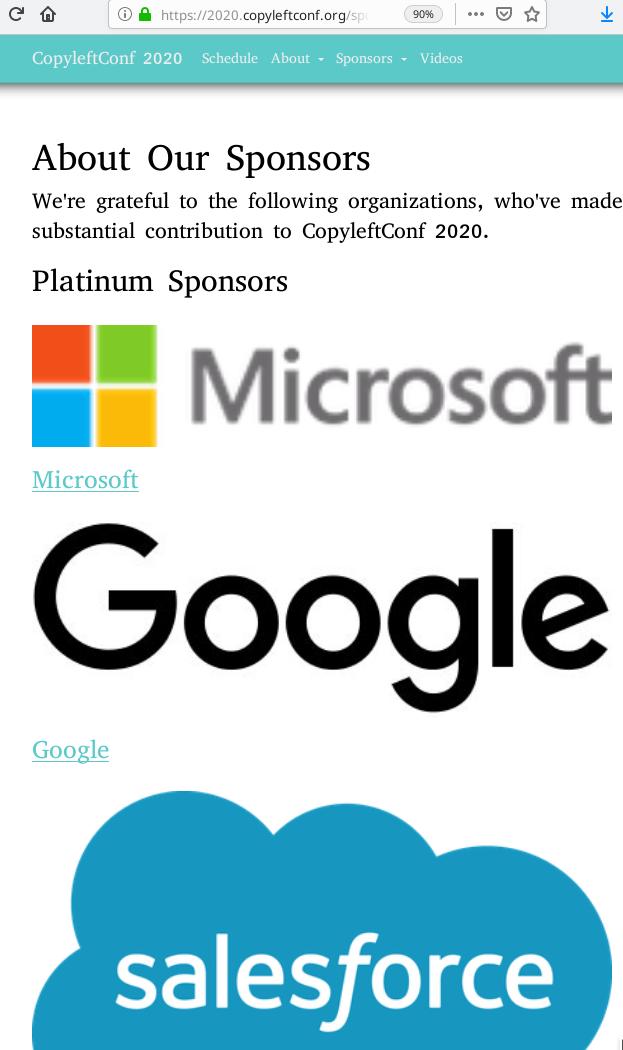

Source: 2020.copyleftconf.org/sponsors
THERE is something truly disturbing going on at SFC. It's not new. We mentioned it before. Other people also habitually mention it. SFC has a growing problem of trust or crisis of confidence because people out there aren't sure what it stands for or who it stands for. Longtime readers are likely familiar with more recent blunders.
Why does SFC take Microsoft money? What does that mean to SFC? What might that say about the origins of Copyleft Conf and its purpose? Remember that in order to keep money coming next year (as well as other future years) they might as well be careful what they publicly say about Microsoft and about its record, e.g. bribery, antitrust abuses, work that kills people and various obvious crimes (with convictions).
The above may not seem like much; after all, it's less than "slush funds" to Microsoft. But it's a lot of money for SFC. It helps pay the rent, food and so on. It can make SFC almost dependent on Microsoft. And that's a problem.
Remember that in politics or political spheres this is how the most classic and likely most common form of bribery works.
We've asked SFC for comment on this; we gave them a chance to explain or to clarify. Half a day later the Conservancy's staff has not replied to this request for comment, so we decided to go ahead with the story and actually type it up. We also extended the offer for response several more hours. So remember; we politely reached out for comment, but they refuse to even explain the above. Microsoft is undoubtedly behind several anti-GPL campaigns, so SFC cannot just claim that Microsoft changed; Microsoft just gave them "some change" (small money or pocket money to Microsoft, but a lot to SFC). All those anti-GPL GitHub-based 'studies' remind us that the GPL-hostile agenda of Microsoft has only been taken up several more notches in recent years; those are all Microsoft. Microsoft isn't only a GPL violator; Microsoft got caught several times.
Why is Microsoft's name at the very top of a page of something called "Copyleft Conf"? We could go ahead and remark/criticise some of the speakers, but this article can be more powerful when it is impersonal, focusing on issues and companies, nothing ad hominem at all. The Linux Foundation likes to personify some of the bad things it does; that's a trap. And we won't fall into it.
So why is an anti-GPL company a "Platinum Sponsor" of this event? That's an odd thing for something called "Software Freedom Conservancy" to do. But remember that those are the same people who pushed Richard Stallman out of the FSF. Notice how also Salesforce creeps it; it's the company whose high-level staff did the same, pushing hard for Stallman to be kicked out along with anyone who supports him. This is well documented. So what the heck is this event anyway? Why is it controlled and led by such companies? And not for the first time (we mentioned this before, after the first such event); Microsoft and Google were there last year as well. Yes, the first one was also funded by Microsoft and one might theorise who came up with the idea of having such an event and raise funds for it. Yesterday the SFC wrote about it, as did few others online, mostly in social control media. The E-mail message from Deb Nicholson was reprinted by LWN and it says this:
URL: https://sfconservancy.org/news/2020/apr/29/cc2video/
In February, we ran our second annual [Copyleft Conf]( https://2020.copyleftconf.org/). Thanks to our program committee; Molly de Blanc, Beth Flanagan, Bradley Kuhn, Deb Nicholson, Nithya Ruff, Josh Simmons and Haralde Welte, the [schedule]( https://2020.copyleftconf.org/schedule/) was both bold and timely. We are happy to announce that all the videos of this year's sessions are now [available for you to watch.](https://2020.copyleftconf.org/video)
This year's [keynote]( https://archive.org/details/copyleftconf2020-sebro) was delivered by [Tony Sebro](https://wikimediafoundation.org/profile/tony-sebro/), who is Vice President of Counsel for the Wikimedia Foundation, former General Counsel of Conservancy, and serves on the Outreachy organizer's committee. In his talk, Tony wonders whether the community around copyleft, like those around eschatology and Afro-centric hip-hop, has lost it's center and how we might entice new stakeholders to reinvest in our shared values. His keynote is a great place to start with this year's videos.
We also want to especially thank Coraline Ada Ehmke for participating in Copyleft Conf. She describes our responsibility as technologists and shared her plan for building a movement to keep technology from being used by bad actors. Both [her talk]( https://archive.org/details/copyleftconf2020-ehmke) and the [community discussion]( https://archive.org/details/copyleftconf2020-ethical-lice...) that followed are available to watch now. The passionate conversation around ethical licensing was cited by many as a highlight of the conference and we're glad we were able to host it at Copyleft Conf.
In case you missed it, our first year's keynote was Molly de Blanc. She's the Manager of Strategic Initiatives at GNOME Foundation. There was [a Faifcast episode](http://faif.us/cast/2019/may/31/0x68/) where Bradley and Karen discuss her talk, "The Margins of Software Freedom" coupled with an onsite interview. Many of the 2019 Copyleft Conf videos are also [available to watch.](https://2020.copyleftconf.org/video)
We have no way of knowing what 2021 will mean for in-person events, but we will continue to advocate for and discuss copyleft as a tool for software freedom -- stay in touch by following us on [Mastodon]( https://mastodon.technology/@conservancy) or [Twitter]( https://twitter.com/conservancy) or swing by #conservancy on freenode.net to talk with folks in real time, any time, but [especially on Thursdays at 6pm UTC.]( https://sfconservancy.org/blog/2020/mar/12/virtualchat/)
About Conservancy
Conservancy is a resourceful, non-profit organization dedicated to helping people take control of their computing experience by growing the software freedom movement, supporting community-driven alternatives to proprietary software and defending free software builders with practical initiatives. Conservancy believes that the future of software should be for everyone.
-- Deb Nicholson <deb@sfconservancy.org> Software Freedom Conservancy